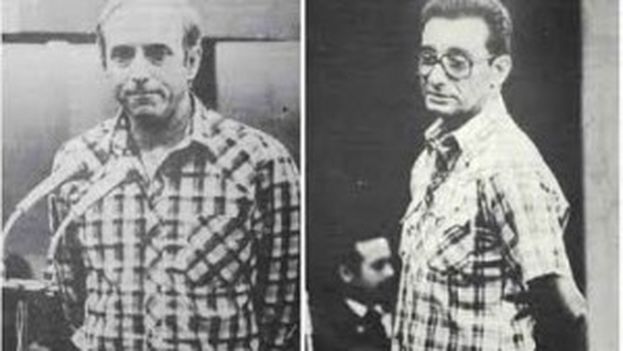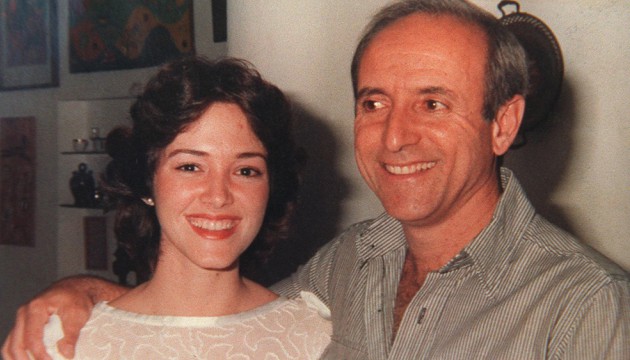
![]() 14ymedio, Ileana de la Guardia, Paris, 5 December 2016 – Dawn comes to Paris, this 26 November, the sun barely over the horizon. From the depths of my dreams I hear the phone ring. I don’t want to answer it. It is my husband who does so. His voice tells me:
14ymedio, Ileana de la Guardia, Paris, 5 December 2016 – Dawn comes to Paris, this 26 November, the sun barely over the horizon. From the depths of my dreams I hear the phone ring. I don’t want to answer it. It is my husband who does so. His voice tells me:
“He died, he died, wake up! Fidel died!”
I murmur:
“Him again… he comes again to wake me from my dreams.”
Thus it was 27 years ago, when they announced the arrest of my father. And so, this call pursues me like a ghost. No, I don’t want to wake up, he doesn’t have that right.
Some hours later I get out of bed and from my window I can see the Eiffel Tower on the horizon, my symbol of freedom, of my freedom. Then the horrible memories return: the murder of my father, of course, and of all the others who paid with their lives for the blindness of the tyrant.
Is he really dead this time? There is no doubt. I feel relieved, as if freed from the persecution of a maleficent shadow.
The monster died in his bed, without even being bothered by his crimes. The funeral rites are already prepared. Nothing is left to chance. No one is going to spit on his ashes. And yet…
My father, Tony de la Guardia, departed at dawn on 13 July 1989. He didn’t have the luck to grow old, to know his grandchildren, he was a confidant of the tyrant. He had served in difficult military missions, at times secret ones.
On 12 June 1989 he was arrested by the political police. A month later, after a summary trial, which I will allow myself to call Stalinist, Fidel Castro ordered him shot without mercy. He had not betrayed anyone, nor cheated, nor stolen. He had only carried out the orders of Castro himself: “Find hard currency, by any means, to save Cuba from disaster.”
That day the world collapsed around me. I was young, not political, convinced that Fidel Castro — who at that time, like so many of my generation, I nicknamed El Congrejo, The Crab because with him everything was always backwards — taking into account the missions my father had served on, would pardon his life. It wasn’t like that.
At the same time as my father, Arnaldo Ochoa was shot. The great general of the Cuban Army, The Lion of Ethiopia as the Africans called him when he served on missions over there. Another two officials, Amado Padrón and Jorge Martínez, were also sent to the firing squad. My uncle, General Patricio de la Guardia, my father’s twin brother, was sentenced to 20 years in prison, “for failing to promptly denounce his brother,” as the text of the sentence prepared by the prosecutor states. Today he is in Cuba under house arrest.
All these men fell under suspicion because they felt a certain weakness for Gorbachev’s perestroika. Castro had no real proof, just doubts, from statements of discontent made somewhere, in some meeting of officers, at some family gathering. He had to make an example. Stop this wave from spreading. Be ruthless. Exercise terror to perpetuate his kingdom… Forever.
Despite these terrible memories, I go for a walk in Paris. The city opens its arms to me. I realize what good luck I have. I came to France in 1991, the country of Voltaire, the champion of freedom of expression. Voltaire, the enemy of tyrants, whom I love more every day, because he knew the price of freedom.
Curiously, I am happy, even if in principle we should not rejoice in the death of a human being. I know that I should not jump for joy, but I can’t contain myself. Because beyond all the funeral rites that are intended to be grandiose and docile, as in all communist regimes, what I see is the executioner. The hard man, implacable, willing to sacrifice his closest collaborators to protect his system.
And his power. How can I not seem my father trapped in the lies of the dictator? To get rid of him and others, Castro sold them a perverse and criminal fable: for the good of the country, of the Revolution, he asked them to incriminate themselves for offenses they had not committed. A classic of Stalinist regimes, where children denounced their own parents.
At that time, the agency that fought against drugs in the United States, the Drug Enforcement Administration, suspected that Fidel Castro was lending, charging very dearly, parts of his territory, including his airports, to Colombian drug traffickers as a transit area. How to escape this trap? Turn some high officials into scapegoats, high officials suspected of sympathy for Gorbachev. My father, like the others, persuaded that Fidel demanded of them a new sacrifice, and perhaps to protect their families, accepted this farce without imagining it would cost them their lives.
The process was a sham, a nightmare. At the end of the trial the monster had them shot as traitors. I have been living with this image of horror for 27 years. I see my father’s smile, exhausted by imprisonment and interrogations. His last look full of tenderness. They did not even allow us to put his name on a grave in the cemetery in Havana. He was erased from history. Forgotten, thrown into a common grave, like the heretics of the Middle Ages.
Today I shouted his name so that it will never be forgotten: Tony de la Guardia, my beloved father. May my voice cross the Atlantic to the Malecon in Havana, where dreams are lost on the horizon.
From Paris, I think about all the Cuban families who have experienced tragedies similar to mine. That also mourn their dead in silence and with fear in their bellies, with the hope that perhaps one day they will have the right to return home.
Today, the despot is nothing more than an urn with ashes, but the system didn’t collapse along with him. The propaganda machinery is working at full steam. The political police are not on strike: they spy, monitor, intimidate, beat and isolate all those who disagree, all those who make demands.
Raul Castro has undertaken some insufficient changes, it’s true, why deny it? One more masquerade? A simple trick to escape the judgment of History?
To those who cry for Fidel, with sincere or crocodile tears, I ask you to open your eyes, to listen to the stories of the pain of hundreds of families, victims of the dictatorship. The Castro dynasty wants to perpetuate itself so as to never be called to account for more than 50 years in power.
It is difficult to have illusions; the descendants of the comandante are still pulling the strings of the country. Fidel is dead, but his family is still in charge. Raul Castro’s son directs the repression and intelligence services and his son-in-law manages the country’s economy with an iron hand.
Without hate, without rancor, I demand justice for my father and for others, the political opponents, the cursed poets, the homosexuals, the military dissenters. This dynasty of hoarders must go.
From me, they took everything. I don’t even have the right to step foot on the land of my family, the land where I was born. I have no property, no fortune, but I possess the most beautiful of all diamonds: freedom.
I offer it to my father, Cuban martyr. One day I will put a bouquet of flowers and a marker over his grave. I swear.

___________________________________
Editor ‘s Note: This text was published in Le Nouvel Observateur. It is reproduced with permission from the author.
